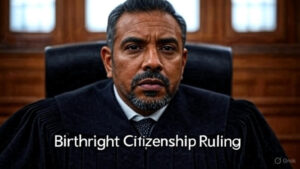The 2025 Supreme Court Birthright Citizenship Ruling: A Landmark Decision

In a historic and controversial decision, the U.S. Supreme Court ruled in Louisiana v. Callais (2025) that birthright citizenship—the principle that anyone born on U.S. soil is automatically a citizen—does not apply to children of undocumented immigrants. The 6-3 decision, split along ideological lines, has ignited fierce debate over immigration policy, constitutional interpretation, and the role of the judiciary.
This article examines:
-
What birthright citizenship is
-
The Supreme Court’s ruling and its reasoning
-
The political and legal implications
-
Reactions from justices, lawmakers, and legal scholars
-
What comes next for immigration policy
What Is Birthright Citizenship?
Birthright citizenship, also known as jus soli (“right of the soil”), is the legal principle that any person born within a country’s territory automatically gains citizenship, regardless of their parents’ immigration status.
Birthright Citizenship in the U.S. Constitution
The 14th Amendment (1868) states:
“All persons born or naturalized in the United States, and subject to the jurisdiction thereof, are citizens of the United States and of the State wherein they reside.”
For over 150 years, this clause was interpreted to mean that any child born on U.S. soil (with few exceptions, such as children of foreign diplomats) is a U.S. citizen.
Countries with Birthright Citizenship
The U.S. was one of about 30 countries with unrestricted birthright citizenship, including Canada and Mexico. Many European and Asian nations require at least one parent to be a citizen or legal resident.
For more insights on legal protections in other countries, check out our guide on Senior Insurance in the UK (2025).
The Supreme Court’s 2025 Ruling: Louisiana v. Callais
Case Background
The case arose from a Louisiana law that denied birth certificates to children of undocumented immigrants, arguing they were not “subject to the jurisdiction” of the U.S. under the 14th Amendment. The Biden administration sued, claiming the law violated federal immigration authority.
Lower courts blocked the law, but the Supreme Court took the case to resolve whether birthright citizenship applies to children of unauthorized immigrants.
The Court’s Decision (6-3)
-
Majority: Roberts (Chief Justice), Thomas, Alito, Gorsuch, Barrett, Kavanaugh
-
Dissent: Jackson, Sotomayor, Kagan
The majority ruled that the 14th Amendment’s phrase “subject to the jurisdiction thereof” excludes children of undocumented immigrants, as their parents owe allegiance to another nation.
Key Arguments:
-
Originalist Interpretation: Justice Barrett, writing for the majority, argued that the 14th Amendment was intended to grant citizenship to freed slaves, not to children of unauthorized immigrants.
-
Congressional Authority: The Court deferred to Congress, stating that if lawmakers want to grant birthright citizenship to undocumented immigrants, they must pass a law.
-
Historical Precedent: The majority cited the 1898 United States v. Wong Kim Ark case but distinguished it, arguing that Wong’s parents were legal residents, not unauthorized immigrants.
Dissent: Justice Jackson’s Fiery Rebuttal
Justice Ketanji Brown Jackson, in a scathing dissent, accused the majority of “rewriting history” and “legislating from the bench.” She argued:
-
The 14th Amendment’s text is clear and inclusive.
-
The Wong Kim Ark ruling already settled this issue in favor of birthright citizenship.
-
The decision creates a two-tiered system of citizenship, undermining equality.
For more legal analysis, visit our homepage.
Political and Legal Fallout
Immediate Effects
-
Undocumented parents can no longer obtain birth certificates for U.S.-born children in states enforcing the ruling.
-
Legal challenges are expected as immigrant rights groups file lawsuits.
-
Congressional battles loom—Republicans may push to codify the ruling, while Democrats seek to restore birthright citizenship via legislation.
Trump’s Role and the 2024 Election
Former President Donald Trump, who repeatedly vowed to end birthright citizenship by executive order, praised the ruling:
“The Supreme Court affirmed what we’ve always said—birthright citizenship was being abused. Now we must secure the border!”
Legal scholar Jonathan Turley noted that while the ruling aligns with conservative immigration goals, it may face enforcement challenges without congressional action.
For related legal topics, see our article on Life Insurance in Canada (2025).
Nationwide Injunctions and the “Imperial Judiciary” Debate
The ruling reignited debates over judicial power. Critics argue the Court is engaging in “legislating from the bench,” while supporters claim it is correcting a longstanding misinterpretation.
For further reading on judicial impacts, check out SCOTUSblog (external link).
What’s Next?
-
Congressional Action: Democrats may introduce a bill to reinstate birthright citizenship, but passage is unlikely without control of both chambers.
-
State-Level Enforcement: Red states may deny benefits to children of undocumented immigrants, leading to further lawsuits.
-
2025 Presidential Election Impact: Immigration will be a central issue, with Republicans pushing stricter policies and Democrats condemning the ruling as xenophobic.
For updates on policy changes, follow The New York Times (external link).
Conclusion: A Transformative Ruling
The Supreme Court’s decision in Louisiana v. Callais marks one of the most consequential immigration rulings in decades. By reinterpreting the 14th Amendment, the Court has upended a century of precedent, setting the stage for a fierce legal and political battle over who gets to be an American.
As Justice Jackson warned in her dissent:
“Today, the Court has taken a sledgehammer to the foundation of equality. The consequences will be felt for generations.”
The debate over birthright citizenship is far from over—it’s just beginning.
Related Searches:
-
Birthright citizenship countries
-
Supreme Court rulings today
-
Trump v. CASA
-
Does the 14th Amendment guarantee birthright citizenship?
-
How does this affect DACA?
For more legal insights, visit Nobbe.site or explore Pew Research Center’s analysis (external link) on immigration trends.
